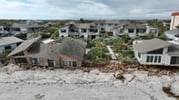 As the remnants of Hurricane Idalia pummeled the East Coast, this week it’s becoming clear that property owners may feel the resulting impacts for months or even years. The devastation underscores the importance of strong building codes and code enforcement as a front-line defense against increasingly extreme weather events. As climate change increases the scale and severity of natural disasters, strong building codes will save billions in repairs, according to a recently published Scientific American article.
As the remnants of Hurricane Idalia pummeled the East Coast, this week it’s becoming clear that property owners may feel the resulting impacts for months or even years. The devastation underscores the importance of strong building codes and code enforcement as a front-line defense against increasingly extreme weather events. As climate change increases the scale and severity of natural disasters, strong building codes will save billions in repairs, according to a recently published Scientific American article.
Same Message, New Urgency
Scientific American cited a 2018 study in Land Economics that found houses built after Florida adopted statewide building codes based on the International Code Council’s (ICC) model code saw 72% fewer insurance losses from wind-related damage. Further, research conducted by the National Institute for Building Sciences and the Federal Emergency Management Agency (FEMA) found that for every dollar spent on conforming to the 2018 ICC, $11 in damage costs are saved.
Yet despite the urgent need for updated building codes, about 30 percent of new construction is happening in places that either have no statewide building code or haven’t updated their code in 20 years. In the face of increasingly severe weather and staggering replacement costs for property owners, that simply defies logic.
Home builders have frequently cited increased construction costs in their opposition to adopting stronger codes. However, the Scientific American article concludes that several studies have shown no effect. Even in cases where there is a small increase in costs due to stronger building code adoption, the cost savings recouped through savings in insurance premiums (which are up 20 percent over last year), energy use, and averted damages are well worth that investment.
“Prior to joining NAIMA, I would travel around Texas and Oklahoma to do field trainings with inspectors, builders, contractors, and others, and it was readily apparent when those trainings were being held in cities with updated codes and robust enforcement,” said NAIMA’s Director of Technical Services Jason Vandever. “Adopting an updated code is part of the puzzle that can only be completed with knowledgeable code enforcement. Far too often, it’s the case that builders push back on base code requirements, and cities often amend the code to make it weaker upon pressure from builders. In the long run, a weaker code doesn’t help anyone and ends up costing more money and causing headaches and heartache.
Conclusion
Climate change and its resulting effects on natural disaster frequency and intensity is a long-term global challenge. As states and jurisdictions consider the safety, economic benefits, and resiliency of properties, a continued effort to adopt and enforce strong building codes (including those that promote increased thermal envelope efficiency) is warranted and well supported by scientific research.





